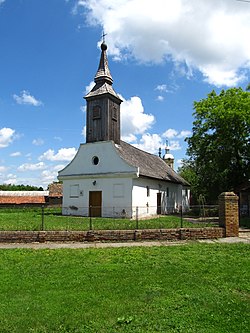Top Qs
Timeline
Chat
Perspective
Ečka
Village in Vojvodina, Serbia From Wikipedia, the free encyclopedia
Remove ads
Ečka (Serbian Cyrillic: Ечка, pronounced [êtʃka]; Romanian: Ecica, Hungarian: Écska) is a village located in the Zrenjanin municipality, in the Central Banat District of Serbia. It is situated in the autonomous province of Vojvodina on the Begej river.
You can help expand this article with text translated from the corresponding article in Serbian. (March 2011) Click [show] for important translation instructions.
|
Remove ads
Name and history
In Serbian, the village is known as Ečka (Ечка), in Romanian as Ecica or Ecica Română, in German as Deutsch-Etschka, and in Hungarian as Écska (until 1899: Német-Écska).
The village was merged with former settlement known as Mala Ečka (Мала Ечка) in Serbian, Alt Etschka in German, and Román-Écska or Olahécska in Hungarian.
Ethnic groups (2002 census)
The village has a Serb ethnic majority and its population numbering 4,513 people (2002 census).
- Serbs = 2,483 (55.02%)
- Romanians = 1,325 (29.36%)
- Hungarians = 196 (4.34%)
- Yugoslavs = 123 (2.73%)
- Romani = 72 (1.60%)
Historical population
- 1900: 4,892
- 1931: 5,207
- 1948: 3,934
- 1953: 4,188
- 1961: 4,323
- 1971: 4,621
- 1981: 5,293
- 1991: 5,172
- 2002: 4,513
- 2011: 3,999
- 2022: 3,406
Culture
Summarize
Perspective

Kaštel Ečka is a historic hunting castle and a cultural monument. The estate was purchased by the Lazar family in 1781 and developed over the following decades. At the Castle's grand opening ceremony in 1820, Franz Liszt played piano as a nine-year-old boy. Kaštel Ečka estate includes the main building, horse stables, and the water tower.[2][3]
In 1870, after the death of the last male member of the Lazar family and the castle owner, Sigismund Lázár de Ecska (d. 1870), his widow, Viktoria Edelspacher de Gyorok (1841-1895) inherited the castle. In 1871, due to her second marriage to Prince Egon Maximilian (1832-1892), the castle becomes the property of the House of Thurn und Taxis, later owned by the families of Harnoncourt and Pallavicini until the end of the WWII.[4]
There are three churches in Ečka:[3]
- Serbian Orthodox Church of St. Nikola was built in 1711. The iconostasis is the work of Teodor Popović from 1786.[5][6]
- Romanian Orthodox Church was built in mid 19th century. The interior is equipped with an iconostasis and a throne of the Virgin brought from the church in Crepaja.[7]
- The Catholic Church of St. John Baptist was built in 1864 and financed by the Lazar Family. It is located at the place of an older church, adjacent to Kaštel Ečka.[2]
Remove ads
Education
The first school in Ečka was established in 1711, within the Serbian Orthodox Church. New school was built in 1894, with initial classes in Romanian language and classes in Serbian added at a later date. Today's school "Dr Aleksandar Sabovljev" was established in 1957, and still has classes both in Romanian and Serbian.[8]
See also
References
External links
Additional pictures
Wikiwand - on
Seamless Wikipedia browsing. On steroids.
Remove ads


